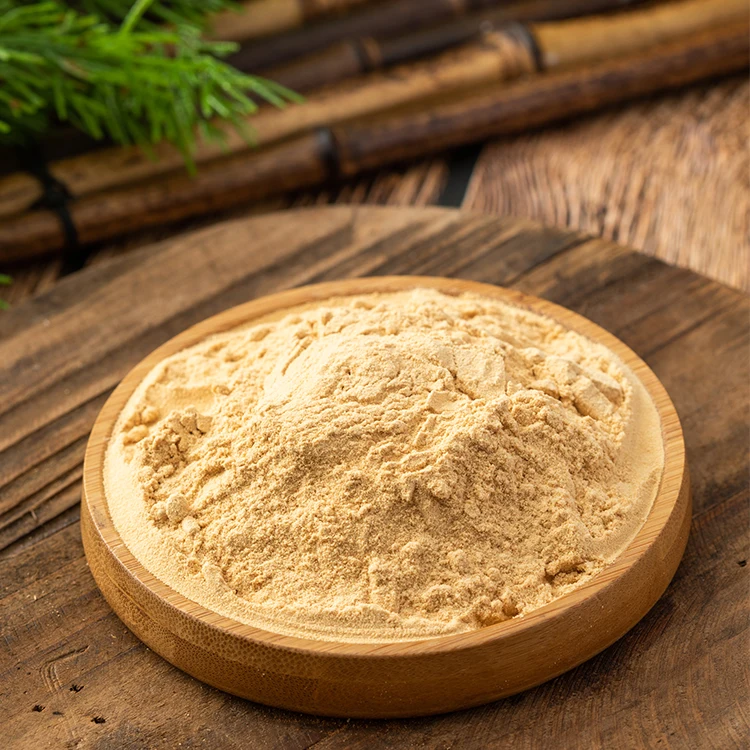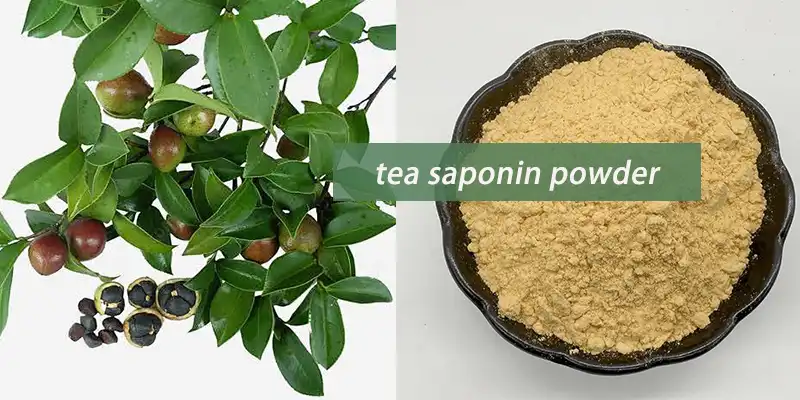In the domain of common compounds, tea saponin has risen as a powerful and flexible substance with a myriad of potential wellbeing benefits. Inferred from various tea plants, counting the eminent Camellia sinensis, tea saponin has provoked the intrigue of researchers and wellbeing enthusiasts alike. This article digs into the captivating world of tea saponin, investigating its beginnings, properties, and the various ways it can contribute to your well-being.

The Origins and Chemistry of Tea Saponin
Tea saponin is a naturally occurring compound found in tea plants, particularly in the seeds and leaves of Camellia sinensis, the plant species responsible for producing green tea, black tea, and oolong tea. Saponins are a class of compounds characterized by their soap-like foaming properties when mixed with water. The term "saponin" is derived from the Latin word "sapo," meaning soap.
Chemically, tea saponins are triterpenoid glycosides, consisting of a hydrophobic aglycone (sapogenin) attached to one or more hydrophilic sugar chains. This unique structure gives tea saponins their amphiphilic nature, allowing them to interact with both water and lipids. This property is crucial for many of the biological activities associated with tea saponins.
While green tea extract is well-known for its health benefits, it's important to note that tea saponin is a distinct compound. Green tea extract primarily contains catechins, such as epigallocatechin gallate (EGCG), while tea saponin is a separate class of compounds found in tea plants. However, both contribute to the overall health benefits associated with tea consumption.
The extraction of tea saponin typically involves processes such as hot water extraction, organic solvent extraction, or supercritical fluid extraction. These methods aim to isolate and concentrate the saponin compounds from the plant material, resulting in a purified form that can be used for various applications.

Health Benefits and Potential Applications of Tea Saponin
Tea saponin has garnered attention for its diverse range of potential health benefits. While research is ongoing, several studies have highlighted promising effects that warrant further investigation:
- Antioxidant Properties: Tea saponin exhibits potent antioxidant activity, helping to neutralize harmful free radicals in the body. This property may contribute to reducing oxidative stress and inflammation, which are associated with various chronic diseases.
- Cardiovascular Health: Some studies suggest that tea saponin may have a positive impact on heart health. It has been shown to potentially lower cholesterol levels, reduce blood pressure, and improve overall lipid profiles.
- Anti-inflammatory Effects: Tea saponin has demonstrated anti-inflammatory properties in various experimental models. This could have implications for managing inflammatory conditions and supporting overall immune function.
- Antimicrobial Activity: Research has indicated that tea saponin possesses antimicrobial properties against certain bacteria and fungi. This could potentially be harnessed for natural preservatives or antimicrobial applications.
- Weight Management: Some studies have explored the potential of tea saponin in supporting weight management efforts. It may influence lipid metabolism and fat absorption, although more research is needed to fully understand its effects.
- Neuroprotective Potential: Preliminary research suggests that tea saponin may have neuroprotective properties, potentially benefiting cognitive function and brain health.
- Skin Health: The antioxidant and anti-inflammatory properties of tea saponin may contribute to skin health, potentially aiding in protecting against UV damage and supporting skin repair processes.

Applications and Future Prospects of Tea Saponin
The unique properties of tea saponin have led to its exploration in various fields beyond human health:
- Agricultural Applications: Tea saponin has shown promise as a natural pesticide and plant growth regulator. Its ability to interact with cell membranes makes it effective against certain pests while being environmentally friendly.
- Aquaculture: In the field of aquaculture, tea saponin has been investigated for its potential to improve water quality and fish health. It may help reduce ammonia levels and enhance the immune response of aquatic species.
- Food Industry: The emulsifying and foaming properties of tea saponin make it an attractive natural additive for the food industry. It could potentially be used as a stabilizer or texturizer in various food products.
- Cosmetics: The skincare industry is exploring tea saponin for its potential benefits in anti-aging formulations, UV protection, and natural cleansing products.
- Pharmaceutical Research: The diverse biological activities of tea saponin have sparked interest in pharmaceutical research. It is being studied as a potential adjuvant for vaccines and as a carrier for drug delivery systems.
As research continues to uncover the full potential of tea saponin, we may see an expansion of its applications across various industries. The growing interest in natural and sustainable ingredients further enhances the appeal of tea saponin as a multifunctional compound.

Conclusion
Tea saponin represents an exciting frontier in the world of natural compounds. Its unique chemical structure and diverse biological activities make it a subject of ongoing research and development across multiple fields. From potential health benefits to applications in agriculture and industry, tea saponin exemplifies the untapped potential of plant-derived compounds.
For those interested in learning more about tea saponin and other natural plant extracts, HJHERB Biotechnology offers a wealth of information and high-quality products. With over a decade of experience in producing and manufacturing natural ingredients, HJHERB is at the forefront of research and development in this exciting field.
To explore further or to inquire about tea saponin and other natural ingredients, don't hesitate to reach out to HJHERB Biotechnology at info@hjagrifeed.com. Their team of experts can provide valuable insights, free samples, and formulation support to help you harness the power of natural compounds like tea saponin in your products or research.
References
Chen, Y., et al. (2018). "Tea saponins: A review of their chemical, biological, and pharmacological properties." Food Chemistry, 268, 233-241.
Zhao, X., et al. (2016). "Tea saponin inhibits α-glucosidase activity and increases glucose uptake in adipocytes." Nutrition Research, 36(10), 1095-1102.
Yang, Z.G., et al. (2015). "Antioxidant and immunity activity of water extract and crude polysaccharides from Camellia oleifera Abel. seed." Carbohydrate Polymers, 127, 52-58.
Hu, J., et al. (2017). "Tea saponin as a novel adjuvant for enhancing the immune response to recombinant subunit vaccines." Vaccine, 35(10), 1385-1392.
Wang, Y., et al. (2019). "Tea saponin improves growth performance, antioxidant capability and immunity of weaned piglets." Animal Nutrition, 5(4), 370-375.










